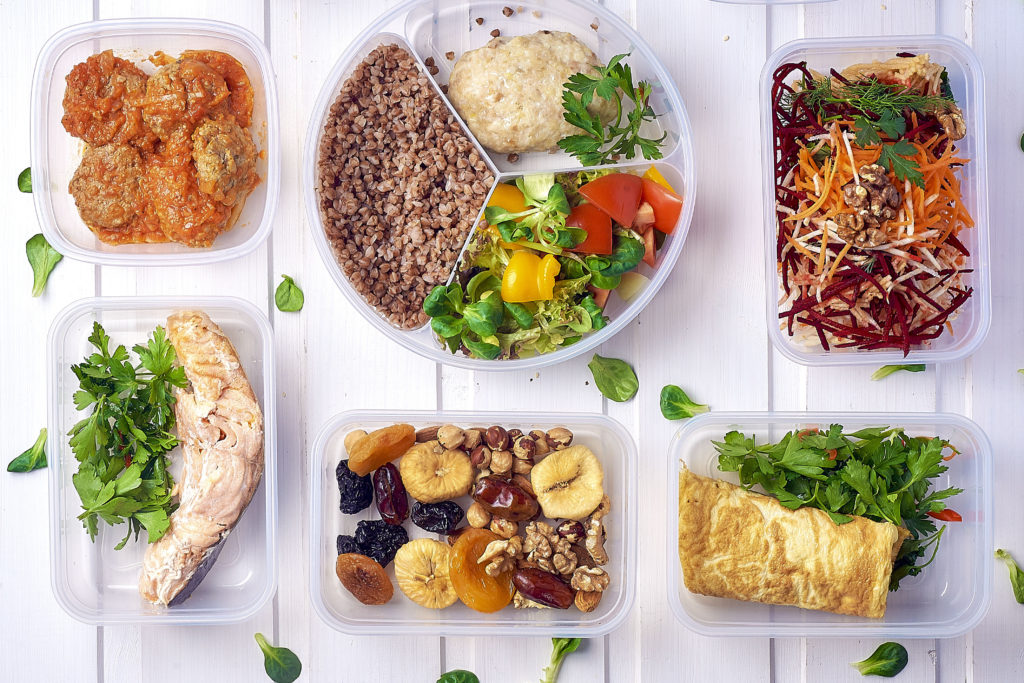
Things change after the Honeymoon Phase that follows bariatric surgery. Here’s how to get back to basics with your diet when you’re 6-12 months post-op.
After bariatric surgery, there’s a “perfect storm” of contributing factors that makes losing weight seemingly effortless. We’ve heard this period of time called “The Honeymoon Phase.” Here’s what happens:
- You just had surgery so you’re not going to be hungry
- You have to heal from your surgery so you’re following a 4 Phase Diet that dramatically restricts calories, carbs and fat
- You’re more motivated than ever because you decided to take action and have surgery to lose the weight you need to lose
Would you rather watch a video of this article?
All three of these points work together to cause rapid and exciting weight loss in the 6-12 months following your bariatric surgery, but what happens after that first year when the number on the scale stops getting smaller (or starts to get higher)?
Table of Contents
- What should your diet look like 1 year after bariatric surgery?
- 4 Phase Diet: Phase 4 Recap
- Calories 1 year after Gastric Sleeve
- Protein 1 year after Gastric Sleeve
- Carbohydrates and Fat 1 year after Gastric Sleeve
- Eating Rules
- Meal size and plate breakdown
- Drinking with meals
- What foods should I eat?
- Jump Start Diets
What should your diet look like 1 year after Gastric Sleeve?
The short answer? Your diet should look like it did when you were losing weight after surgery.
It means high protein, low calories, low carbohydrates and low fat.
A phrase I’ve seen thrown around the WLS message boards is “getting back to basics.” That’s generally good advice when it comes to diet because people LOVE making dieting overly complicated.
It’s like they think that the more complicated/rigorous the diet is, that means they’re trying harder and doing everything they can to get the weight to drop.
Fortunately, the basics are all you need in order to enjoy steady and safe weight loss after bariatric surgery.
Like I said a moment ago – your diet 1 year after bariatric surgery should look like the diet you were following when you were losing weight after surgery. That is, the last phase (Phase 4) of your 4 Phase Post-op Diet…the basics.
4 Phase Diet: Phase 4 Recap

The 4 Phase Post-op Diet has one primary goal. And that is to help your stomach heal after the bariatric surgery. The goal is to still provide enough protein and nutrients without the volume that could stretch and tear the surgery site.
That’s why you start with only liquids, move to pureed food, then to soft foods and finally to low calorie, high protein healthy foods.
At Phase 4 you’ve reached the end of the “healing first” mentality and now you’re in “weight loss” mentality.
Since Phase 4 normally starts 4 months after surgery for bariatric patients of all procedure types, everyone will be on this stage of the diet until you reach your goal weight.
Just to refresh you on the basics of Phase 4 diet rules, here are the highlights.
Calories 1 year after Gastric Sleeve
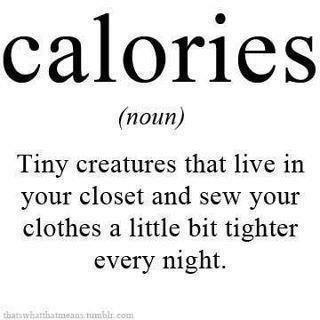
As a general guideline, the Academy of Nutrition and Dietetics suggests 1,200 to 1,500 calories per day for women for weight loss and 1,500 to 1,800 calories per day for men for weight loss.
However, it’s quite common for bariatric clinics to recommend a diet of around 900-1,200 calories after the 6-month mark post-op. This is considered a Very Low-Calorie Diet (VLCD) and should be approved by your doctor or dietitian before starting.
If you’re worried about cutting your calories too low, then start at the higher end of the range provided and follow it strictly for a few weeks. If you don’t see any change do 2 things:
- Are you absolutely, unequivocally meeting that calorie goal? Or is there a possibility that you’re accidentally going over? If so, keep a strict journal and stick with the same number of calories for a few weeks
- Lower your calories by 100 calories for the next few weeks and see if that does the trick, **but don’t go below the bottom of that recommended range without talking to your doctor or dietitian.**
Remember, at its simplest explanation, the success of your weight loss comes down to total calories consumed. If you eat too many calories your weight will go up. If you eat fewer calories than your body burns, your weight will go down.
Removing other factors like social, psychological and other less quantitative measures, weight loss is about energy balance.
That said, there is a handful of other considerations when talking about your diet 1 year after gastric sleeve and other bariatric surgeries…
Protein 1 year after Gastric Sleeve

RNY and Sleeve patients should get at least 60 grams (women) and 75 grams (men) of protein per day.
BPD/DS patients should get more, at least 90 grams of protein per day
When weight loss is the goal there are only 2 things that you need to focus on: Total Calories Consumed and Total Protein Consumed.
If you get those two numbers correct 90% of the time then you will lose weight.
Why is protein so important?
During times of calorie restriction (i.e. trying to lose weight), it’s been proven that higher protein intake is helpful in maintaining lean body mass.
After all, you want to lose weight from body fat, not lean body mass.
Further, protein is the most filling macronutrient, and hunger is arguably the most uncomfortable part about dieting for weight loss. Swap out your carb-laden snack for a comparable protein snack and you can fend off hunger until dinner much, much easier.
Protein and Exercise
If you have begun to exercise, then protein has become even more important to your healthy life after bariatric surgery.
While you’re exercising you are effectively tearing and breaking down muscle tissue, and the natural reaction is for your body to heal/recover and come back stronger to handle the stress you just put it through. But your muscles need the nutrients and building blocks to make that happen.
Protein provides those building blocks. So if you’re exercising and not getting an adequate amount of protein you are not allowing your body to recover properly and you can get injured.
So…get your protein right. Here’s how much protein bariatric clinics recommend :
- Women: >60 grams of protein per day
- Men: >75 grams of protein per day
- BPD/DS: >90 grams of protein per day
Carbohydrates and Fat 1 year after Gastric Sleeve
Here’s the cool part about structuring diet with calorie and protein prioritization: The rest doesn’t really matter.
As long as you are abiding by the first two rules: get your calories and protein right, the rest will fall into place.
Here’s why it works this way. Macronutrients (protein, carbohydrates and fat) each contain calories. So when you look on a nutrition label “Total Calories per Serving” is derived from protein, carb and fat contents.
Numerically here’s how it works out:
- Protein – 4 calories per gram
- Carbohydrates – 4 calories per gram
- Fat – 9 calories per gram
So here are a few examples of how the Carb and Fat portion can fluctuate as long as you get your calories and protein right.

And here is an example of how you can reach the same calories by manipulating only the carbohydrates and fat and leaving protein the same.
Notice how the only thing that changes is how many carbohydrates and how much fat is consumed, but the calories are more or less the same.
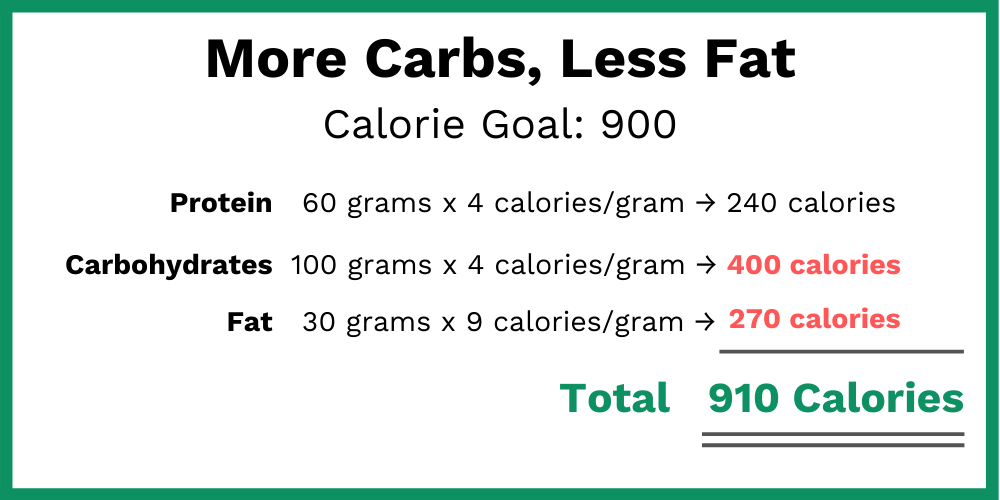
As you can see, in both of these scenarios total calories and total protein stay the same, but you can play with and be flexible with your carbs and fat.
Eating Rules
Now that you know how many calories and how much of each macronutrient, now we’ll talk about eating rules. These are basically quick rules that help you adhere to your calorie and macronutrient goals.
Meal size and plate breakdown
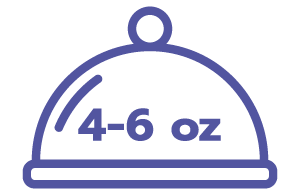
Keep the total size of the meal to 4 – 6 ounces of food.
Measure and weigh everything you prepare and be as accurate as you can be to avoid “calorie creep.”

Make sure your plate is made up of at least ½ to ⅔ protein and the rest made up of vegetables and starches
Eat Protein First
Always eat the protein portion of your meal first. Once you finish the protein move on to the veggies and starches. If you’re full after eating the protein portion stop eating! Don’t worry about the “clean plate club.”
Don’t Drink with Meals
Hold drinking any fluids 30 minutes before your meal, during your meal and 30 minutes after your meal. This will help you feel fuller and help with macronutrient absorption
What foods should I eat?
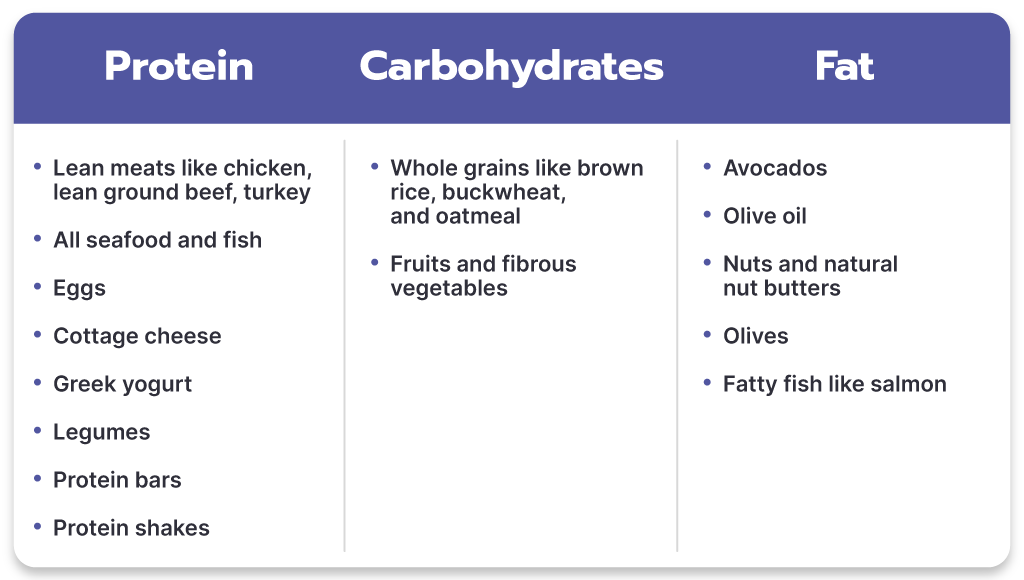
You’ll notice that if you search for most of these food items that your trip to the grocery store will keep you to the perimeter sections of the store. These areas typically have more fresh and unprocessed items, which is a good thing.
Stick to whole food options and supplement with high-quality protein supplements for the sole purpose of helping you reach your daily protein goal.
Supplements are called supplements for a reason – you should aim to get the majority of your protein from whole foods like lean meats, chicken and fish. And if you’re a vegetarian or vegan, there are other options for you like tofu, tempeh and legumes.
Ultimately, weight loss comes down to these key steps:
- Eat the correct amount of calories every day
- Eat enough protein every day
- Eat healthy and nutritious foods
- Count everything you put into your mouth that has calories
If you can do those 4 things 90% of the time you will continue to lose weight in a healthy way. Use this article as a guide to help you get back to basics.
Need help getting back on track? Try a Jump Start Diet
A Jump Start Diet is a short-term, high-protein, low-volume diet to recalibrate your hunger point.
Jump Start Diets normally mimic the standard Post-Op 4-Phase Diet, which progresses you from clear liquids to solid foods during the early months following your surgery.
2-Week Jump Start Diet
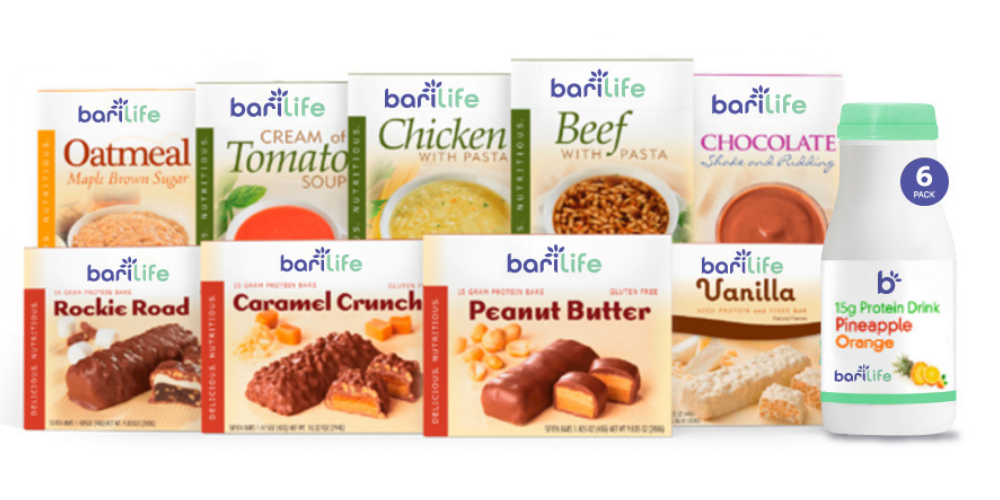
5-Day Jump Start Diet
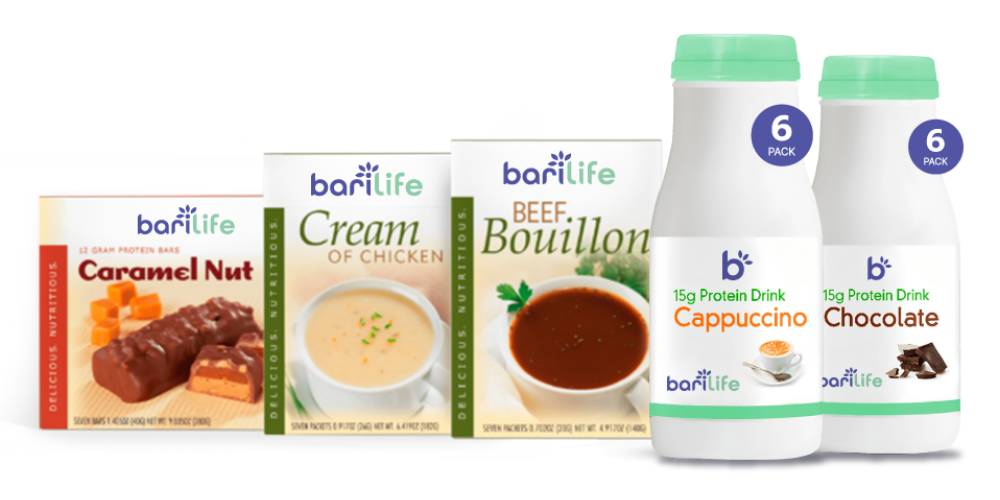
If this sounds interesting to you then check out the 2-Week Jump Start or the 5-Day Jump Start. The differences are subtle, but here’s an overview:
2-Week Jump Start:
- 2-week low-calorie diet
- Week 1 supplements only
- Week 2 transitions to a whole-food diet
- You’re supplied a turnkey bundle so you’re ready to start immediately
- No guesswork – complete printed plan comes with the order
5-Day Jump Start:
- 5-day low-calorie diet
- More “to the point” with an abbreviated schedule
- Supplements only since it’s only 5 days
- You’re supplied a turnkey bundle so you’re ready to start immediately
- No guesswork – complete printed plan comes with the order




I have gained over 60 pounds since my surgery in 2012 I need serious help what do I need to do ?
Go back to the basics for a week
Can I drink coffee made with half caf?
Hi Robin! Yes, generally you can have coffee. It just depends on where you are post-op. Check out this article for a deeper dive into caffeine after surgery:
https://www.barilife.com/blog/caffeine-after-gastric-sleeve/
In 2011 I had a gastric sleeve surgery. I’ve gained back the 65 pounds I lost. I am able to eat more, but I still eat less than the potions my friends eat.
I have a few questions:
– How many meals should I eat in a day? At the moment I eat 4 meals.
– Would it be safe to do 16 hours intermittent fasting?
– If I go on a 2 week liquide diet, would that shrink my stomach a bit?
– I had the operation 9 years ago, so would 65 grams protein per day (women), work for me?
Hi Ellen! Being able to eat more farther out from surgery than you were able to early after surgery is a totally normal thing to happen. You are asking the right questions. Most of the answers are going to be best fielded by your dietitian; however, here’s a little bit of feedback.
Before I touch on your questions I’d first be brutally honest with yourself: are you tracking EVERYTHING you eat? If not, that’s where you should start. It’s incredibly easy for ANYONE to underestimate how much we are actually eating. What feels like 1,500 calories could easily be 2x that much in extreme cases.
Login (or join) to the MyFitnessPal and be diligent for the next 2 weeks on tracking everything that you eat or drink that has calories.
How many meals? This is pretty unique person to person. If you are struggling with 4 meals per day you could try 6 meals and see if that works to help you stick with your calories
Would it be safe to do intermittent fasting? Probably would be safe, but if you struggle with big swings in blood sugar or other things like that definitely run it by your dietitian. They’ll tell in you a split second “yay” or “nay.” But it’s important that you don’t think of IF as a magic solution. It’s simply an eating schedule that helps SOME PEOPLE stick to their daily calorie goal, that’s it. At the end of the day your calories still need to be right.
Will a 2 week liquid diet shrink your stomach? Probably won’t actually shrink your stomach, but it could help recondition your stomach to be “happy” with less amounts of food. This is the goal with our Jump Start Plan.
Also, it’s not very likely that your stomach has actually stretched too much, check out this article: https://www.barilife.com/blog/can-liquids-stretch-your-stomach-after-gastric-sleeve/
It’s really about hunger signals to your brain.
Unless you’re exercising a lot 65grams should be a good goal for daily protein. Check out this page for full “Stabilization Diet” recommendations:
https://www.barilife.com/long-term-diet-after-bariatric-surgery/
Thank you so much for your detailed response and for linking the additional information. You are absolutely right, I do need to track what I am eating, as I am definitely eating more calories than I should be. I will also try the Pouch Reset Plan, as I tend to overeat with my current 3-4 meals a day, instead of having 6 smaller sized portions. Also I do need to eat more protein instead of bad carbohydrates.
And I will make an appointment with my dietitian, since I haven’t been on top of that.
Great, Ellen! That sounds like a plan 🙂 Let us know if you need anything or if we can help!
Hi, I had sleeve 2 years ago, was 100kg now 59kg, I’m struggling to eat more than a few mouthfuls at a time, I collapsed and had a fit a few days ago, went to hospital they checked all the main things brain, heart all good, they are now going to look into hypoglycaemia has anyone else had this issue?
By
I love this site I had my procedure in August 2020 this was stubbled upon by accident but I love the information given….
Hi Sheree! Thanks for commenting, I’m glad that you’re finding it helpful. Is there anything else you are looking for? I can point you in the direction of some other great articles/pages.
For our crash course check out this page if you haven’t already! https://www.barilife.com/start-here/
I too just stumbled up on your website. Do you have like a Seven Day Menu Plan for those of us who like following a plan ?? Thanks for all the great information you’re sharing with everyone !!!!
Hi Angie! We don’t have a 7 day plan specifically…but we do have 5 day Jump Start diet plan and a 2 week Jump Start diet plan that you can use.
It works great, takes all the guesswork out of it and gives you a jumpstart on the right path if you’re needing a little boost! Check them out here:
2 Week Jump Start: https://www.barilife.com/pouch-reset/
5 Day Jump Start: https://www.barilife.com/5-day-pouch-reset/
Those pages explain everything but you can click through to the actual plan itself from that page as well. Let us know if you have questions!
Do you have a menu plan to go buy for busy people like me ?😁. I really appreciate your website….so much useful information !!!!!
IM abput to start my surgery journey
I’m nervous and excited
I’m concerned about grocery bills
Fresh can be expensive and I have 5 mouths to feed
Any suggestions to keep costs low but still able to feed all 6 of us
My grocery bill just got 1 person smaller…I eat like a bird, portions that I could eat in a day last me 3 days. Trust that you may buy yourself better food but the portions are so small your grocery bill is probably going to go down!
Hello i’m 15mths post gastric bypass and i have regained 10kg and i know its from eating wrong foods and to much food. I have a coupe of questions;
How is the best way to get back on track or have i stretch or damaged the bypass ?
How much should i be eating and how often?
Hey Katrina! It sounds like you have a good idea of what’s going on and that’s the hardest part to figure out. Knowing WHAT to do is the next thing. So to answer your questions:
How is the best way to get back on track or have i stretch or damaged the bypass ?
No, I don’t think you’ve effectively stretched your pouch. There will be some natural “stretching” as inflammation goes down after surgery, but it’s really unlikely that you stretch your pouch to the point where it’s not doing its job with restriction. Check out this article on pouch stretching:https://www.barilife.com/blog/can-liquids-stretch-your-stomach-after-gastric-sleeve/
In order to get back on track I’d start by checking out this “Jump Start” diet. It’s NOT a long-term cure but it WILL jumpstart your weight loss and get you back in the mode of less calories but keeping protein high: https://www.barilife.com/pouch-reset/
Then I’d check out this article which goes deep into “Getting back on track.” : https://www.barilife.com/blog/get-back-to-basics-and-stop-weight-gain-after-bariatric-surgery/
Then for long-term “How much should I be eating and how often” Check this article out about your long-term weight loss diet: https://www.barilife.com/blog/gastric-sleeve-diet-after-one-year/
if you have any questions about the referenced articles let me know!
– Derek
I am about 8 months post op from gastric sleeve and have been stuck losing and gaining the same 3-4 pounds. I started to track my food but just can’t seem to get the scale to move. Any Advice?
Hi Cindi! Great job with tracking your food. Just a couple of questions:
1. How long have you been tracking?
2. Are you noticing any trends in your tracking that you weren’t expecting?
3. What are you getting, on average, for calories and protein?
Tracking is the best first step but now let’s use that discovery to make the next decisions!
I am about 8 months post op from gastric sleeve and have been stuck losing and gaining the same 3-4 pounds. I started to track my food but just can’t seem to get the scale to move. Any Advice?
Hi it going on 3 years out since I had the gastric sleeve and I’ve gained about 20lbs and I want to get these 20lbs off and I wanted to eat more protein and workout at least 4 days a week. What is the calorie intake I should eat and how much calories should I burn to be able to lose weight. (calorie deficit) and how do I get all those calories in a day with a small pouch and what diet plan do you recommend.
Thanks
Hi there! Typically our dietitians recommend a starting point of 1,200 calories for women and 1,600 calories for men. If you can track your intake as closely as possible and watch your weight change (or not change) over time then you can make small adjustments.
If your weight stalls for a couple of weeks then drop calories (if it’s cool with your dietitian or surgeon). If you’re losing too much weight too quickly, since it sounds like you’re doing some solid workouts, then you may need to add some calories. Changes by 100 calories at a time is a good amount.
Make sense?
Hi there! I am two years out from my surgery and have hit my goal weight. I, of course, want to maintain this weight, but I’d like to know the best way to go about it. I am female, 5’6, and 145lbs. I am currently eating about 1,400 calories a day, but from what I’m reading that seems like a little much. I also try to consume 80+ grams of protein and ingest a moderate amount of carbs per day. I am sedentary throughout the day, but I lift heavy weights and do a bit of cardio 5 days a week. I haven’t gained any weight, but I’m still scared… I just want to make sure I don’t screw up. What do you think?
Hey Charlie! It sounds like you’re doing all the right things. It’s easy to keep chasing better results, but sometimes it’s good to realize that what’s working is, well, working!
Maintenance is a lot easier than weight loss in some ways, but it’s also more difficult in others. There’s no “progress” to keep you excited, but that just means you’ve made it.
Track your food/calories for a little longer and take note of what happens to your weight. If it stays the same then no change needed. if you gain, cut a little calories. If you keep losing, then add some calories.
Small changes of 100 calories is enough to move the needle without going crazy. Other than that, you can always check with your dietitian to make sure you’re on track!
Hi there! I’m a female based in London. I’d like to know what is the daily intake in grams for fats and carbs.
I know the protein intake is 65g
Can these products be purchased in Melbourne Australia? If not can these products be posted to Melbourne Australia and if not are there similar products on the market that can?
Hello, I am almost 4 years post op. I had a gastric sleeve. In the past six months I gained 3 kg ( about 6 pounds). I have been tracking my meals, beverages, snacks, for the last month and I eat 800 -900 calories per day with a daily intake of 30 -40 g of protein. I only have 8 g of sugar with my coffee, and choose the products for my meals that are sugar free. Unfortunately I can not go to the gym, or exercise at home due to my asthma. In the last month I have lost only 300 g ( about 0.6 pounds).
Do you think that the low protein intake is the reason why I am not loosing weight?
Talking to my surgeon did not help, he said that 6 pounds are not the end of the world,gaining a few pounds is normal, and I can’t do anything about it.
Yet I am not confortable with my weight gain.
Could you, please, give me some advice?
Hi a friend of mine had SADI surgery about 8 months ago
I’m really worried she is not eating enough
She only eats about the amount you could fit in a cupped hand and often in purée form or clear type soups etc
She does however use a protein powder on top of this she does boot camp at the gym every morning and returns to the gym every afternoon she also works in aged care so on her feet most of the day
Could you please show me a typical daily intake or suggested daily meal plan
Cheers
Worried
Hi Guys
I’m 6 yrs post sleeve regained 52 llb over the last 12 months I’ve got this down to 28lb gain …but I’m stalling ..
My exercise Is walking I’m 63 yrs old and have full restriction.
Currently averaging 1000 cals a day struggling to eat more ..
Do I need to try and increase my intake ?
Many thanks